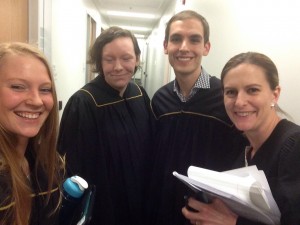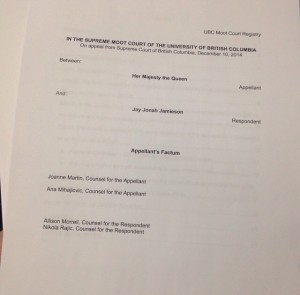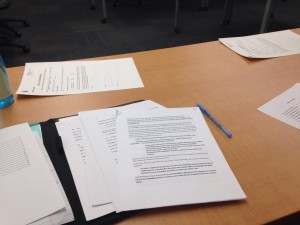Hard to believe 1L is officially over for me and my peers. As we await our first year marks, I’m impressed at how far we have come since September, how much we learned, and how much we all grew into our role as law students.
As I look back, I have to say: it was hard. There were definitely times where I (and many of us apparently) felt like we were simply not cut out for this and dropping out seemed like a legitimate option. There were times where you’d look up from your factum or your transnational law paper at 3 am, eyes bloodshot and blurry and you’d think “is this really what I want to be doing with my life? Do I even want to be a lawyer anymore?” Day after day, we’d drag ourselves in, sleep deprived, over-caffeinated and still so unbelievably behind on our readings. It was literally a Type A’s worst nightmare.
But despite all that, first year was such an amazing experience. Because even though there were definitely those times, there were also lot’s of really awesome times. I couldn’t participate in every single club or event or social, but looking back I actually did quite a few things in my short time at Allard Hall (aka Peter A Allard’s School of Law) and I want to lay them out here for those looking to get involved or try something new. Going into first year I decided that I didn’t want to take on too many things and spread myself too thin. First semester I spent way more time studying, reading, and freaking out about school. By second semester I decided to lay off on the readings a bit (never thought I’d allow myself to do that), to get a little more involved and to have more fun. And I actually enjoyed second semester way more, felt a little more competent and on top of things, and felt more confident during my exams. Every person is different so do what works for you; however if you want my advice (and 1Ls will take all the advice they can get even if conflicting) I think it’s best to stick with 2 extra curicculars max and to really focus on figuring out how to do law school as a new degree with its own unique challenges, first. Once second semester comes along you’ll be in a better position to make adjustments.
LEO – Legal Education Outreach
I joined LEO at the beginning of the year because it was sold to me as a very low commitment activity that was fun. And they were right. LEO basically sends out a group of law students with a (pre-made!) lesson plan to a grade 12 crim class where they present some legal topic (ours was the difference between criminal assault and the tort of battery), answer some questions, and go home. That’s it. You only have to do one presentation and it entails meeting with your group the day before to delegate who says what and when, going to the presentation and doing it. It’s so low commitment and so much fun that most of us were actually sad that we only got to do it once. I think the new heads of LEO for next year are thinking of giving law students more options so that they can present on an ongoing basis if they so choose to,but as far as I know, it’ll still be pretty low commitment. If you’re looking to get involved but the thought of getting behind freaks you out, sign up for LEO — you seriously won’t regret it.
Women’s Caucus
I also joined the WC in 1L not really knowing what to expect but it’s grown on me so much that I’m actually one of the two incoming presidents of the Caucus for next year. So, welcome and please join us! The Women’s Caucus focuses on women in the law, with a special subcomponent of the Caucus dedicated to Aboriginal women in the law. The Caucus attempts to raise awareness and to give women the support they need in a field traditionally dominated by men. We also fundraise a lot to support women in our communities. In the Fall we did a clothing donation and bake sale for women of the DTES, and in the Spring I ended up accidentally spearheading a campaign that turned into a huge success and will be the project of the incoming 1Ls next year. The fundraiser was called TMI – Time of the Month Initiative – and for the whole month of March we collected new boxes of pads, tampons, wet wipes, tissues, and feminine hygiene products in general. We also collected monetary donations and at the end of the month we drove it over to the Downtown Eastside Women’s Centre where we made a pretty large donation on behalf of the UBC Law community. It came about as an idea from a post I saw on fb, and I just decided to go for it. That fundraiser is my proudest UBC Law achievement thus far. The WC also hosts the Women In Law Dinner which is an amazing, inspiring, and totally practical event. Law students get to mingle with accomplished and powerful women lawyers and male lawyers who support women in the law. Next year we hope to make the Caucus more accessible to men by giving them opportunities to be involved. I think that a lot of the time, men shied away from attending events or joining simply because they were unaware that they were invited or welcome. Although the WC does focus on women in the law, we are open and welcome to everyone who is passionate about these issues and who wants to help; the commitment level ranges from very intensive to very low.
Law Revue
I cannot say enough good things about the LR. Unlike the (more boring ;P) Law Review where you review others’ work and groan at how many grammatical errors there are, the Law Revue is literally your high school acting class meets SNL (when it was still good) meets MadTV. When I was in high school I was too scared to try acting because I was worried I’d be bad at it so I stuck with the dance class. In grade 12 when I finally went for it and took the acting class I regretted not taking it sooner. So when I found out that UBC Law had an acting club I signed up without asking a single question. The commitment level might change slightly next year, but basically what it was like this year was you signed up and then nothing happened until December. There was a writer’s meet up where we were encouraged to show up and throw ideas around and brain storm. Then again, nothing happened until the second brain storming session in January. Skits had to be sent in by the end of February for Directors’ approval and the show was in mid March. On the Friday before the show we showed up, got our scripts handed out to us, and we got to work. We rehearsed all weekend and put on our first show that following Monday. Yes, a lot of things went wrong but Tuesday’s show was epic. And the whole experience? Priceless, amazing, hilarious, frustrating, the best thing I did all year. The LR is what pulled me through out of my “I suck at everything, I’m not cut out for law school” slump. I found my niche and my crowd and finally felt like I was good at something again. Because that weekend was more stressful than it needed to be we are planning on better spacing out some of the key events like script writing and rehearsing. But really, the commitment depends on your role in the LR. We have all kinds of positions (writer, actor, singer, dancer, etc etc) so if ANYthing about theatre appeals to you, we want you in our club.
LSLAP – Law Students Legal Advice Program
My experience with LSLAP was very brief but super busy and exciting. I learned a lot and I gained quite a few skills that I wouldn’t have otherwise gained from going to classes alone. At LSLAP you serve underprivileged people in the community by tackling their legal problems under the supervision of a lawyer. You learn to do client interviews and intake, how to manage files, research legal issues, write up various legal documents, make all kinds of important legal calls, give advice, and I even had the chance to go to court and represent a client. It was very stressful for me at first because I didn’t receive any formal training and a lot of the learning comes from simply diving right in and making mistakes. It’s fast paced and can get overwhelming if you’re not organised. However, it’s an experience like no other and really gives you a taste of the legal profession. You have to sign up in September if you want to be a clinician so don’t miss the deadline!
Similar to LSLAP is Pro Bono Students Canada but I never did that so I can only say that my friends who tried it really liked it.
Socials and Events
I didn’t go to very many socials or events in first semester. I remember going to the Boat Cruise and catching some of the Guille Debate which I now wish I had just sat in on because it was so hilarious. In undergrad I studied a lot and the relationship was pretty clear: the less I went out, the higher my grades were. In other words, more studying = better grades. Law school, as I found out, is a bit different. While studying is definitely important, it doesn’t always pan out the way you think or hope it will. In December for example, I really studied hard for this one exam and walked out of it feeling pretty confident. I also totally freaked out about another course, ended up using someone else’s CAN and was sure I bombed. When my marks came back I had actually done pretty poorly on the former and got one of my highest marks on the latter. I was totally annoyed and totally frightened: my marks were so random. Not to mention the fact thatI felt like no matter how many events I had skipped, no matter how hard I had worked, I still felt overwhelmed, stressed, and like I had no control over the outcome of my marks. So in second semester I decided to go to more events and just relax a little. I still worked hard but I didn’t sleep deprive myself just to finish every Dickson J judgement. I learned to work smarter, not harder, and it allowed me to chill out a bit more which in turn helped me feel better, more positive, and more in control. I got to know my peers better and I got to feel like part of my law school community. I found new support systems and made stronger connections. Although I couldn’t make it to semi-formal, I did go to the trike race and it was so much fun. We in the legal community work really hard but we also party really hard too, and seeing your professors in tight and bright clothing with swim caps and goggles on tiny trikes racing towards the finish line while your peers pelt them with water balloons was such a surreal moment — is this really happening?! THIS IS AWESOME
There are a TON of clubs, sports teams (I didn’t even touch on those!), events, and things throughout the year that come up and that are totally worth checking out. 1L is a learning experience for all of us, and the learning curve is very steep. You wade into first week and splash around enjoying the shallows and the sun until BAM you’re knocked off your feet and swept in. For the first month or so you may feel like you’re drowning, struggling to keep your head above the turbulent water. At times it may feel like you’re the only one drowning as others float by effortlessly (how are they doing that!?) but trust me, it’s not just you. At some point you may even feel like giving up and letting the water enclose the top of your head but you cannot let that happen. KEEP KICKING. Gasp and fight and curse the waves but keep kicking. Because one day the waves will stop slapping you across the face and you’ll find yourself riding the waves instead. You’ll still topple over sometimes, you’ll still choke on salty water and get blinded by it, but you’ll learn to get back on that board and back to surfing faster and faster each time.
And that’s what 1L is all about — it’s 1L of a ride.





